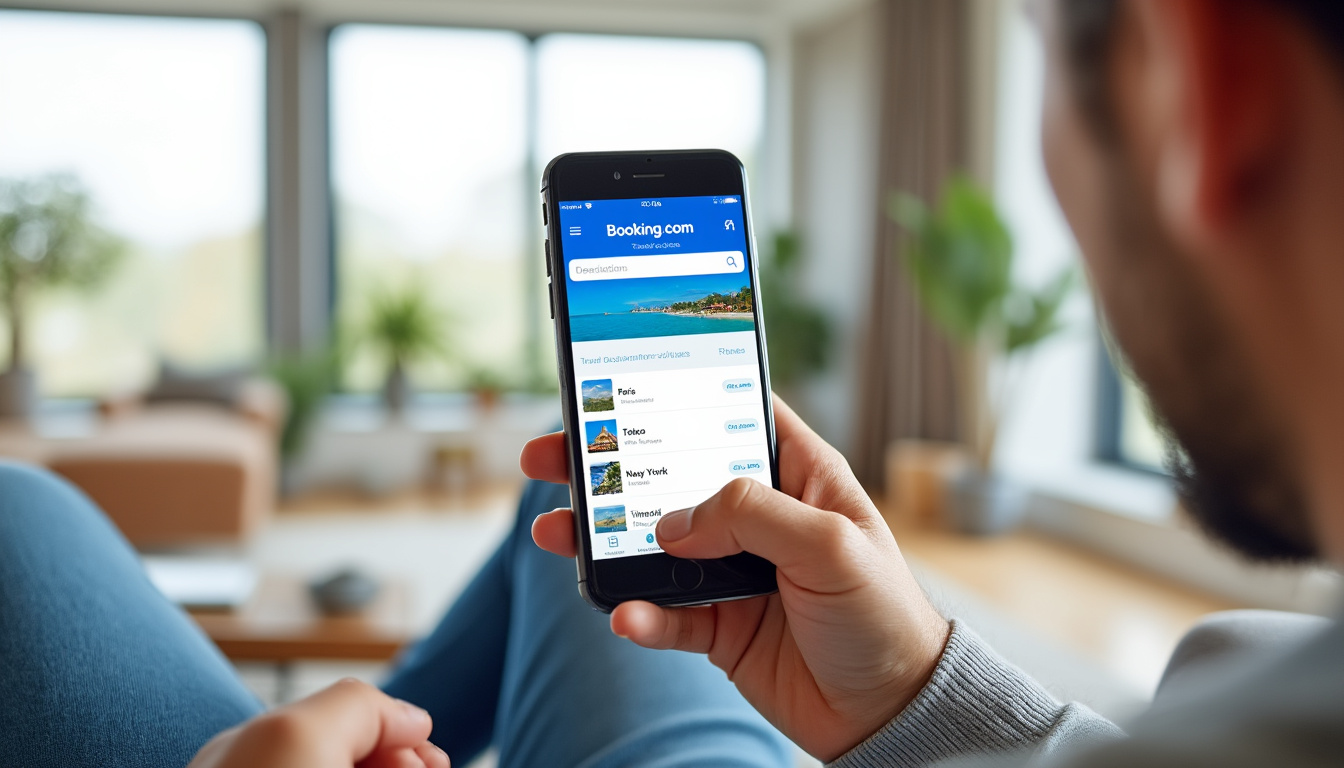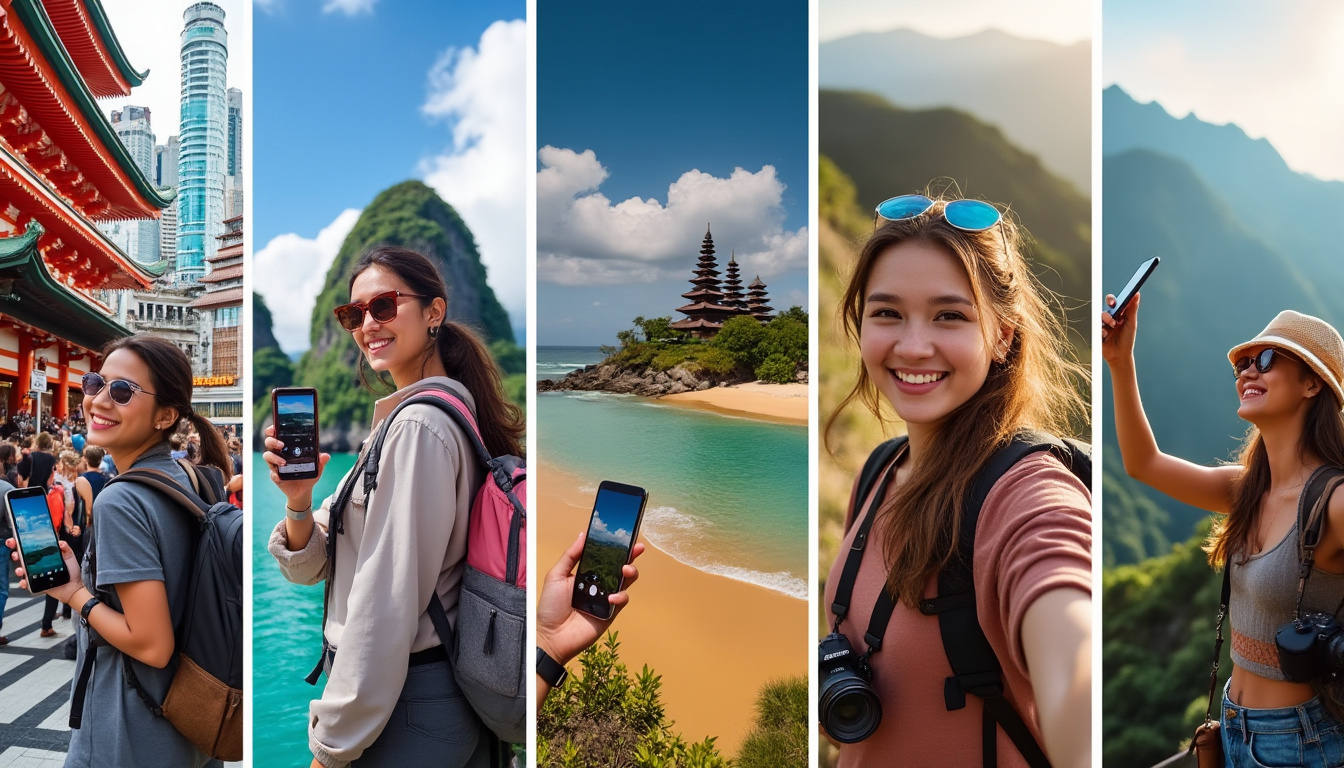The partnership between TikTok and Booking.com represents a significant shift in how travel accommodations are discovered and booked. As social media increasingly plays a pivotal role in travel planning, TikTok’s integration with Booking.com aims to provide a seamless experience for users, capitalizing on the platform’s strong visual appeal.
TikTok’s Evolution into the Travel Sector
TikTok has steadily transformed from a platform primarily dedicated to short, entertaining video content into a significant player in the travel industry. Recent data shows that nearly two-thirds of travelers who use social media for trip planning make booking decisions based on the content they engage with. This pointing towards a substantial opportunity for TikTok to establish its presence in travel-related bookings.
As TikTok users gravitate towards travel-related content — including destinations, hotels, and experiences — the app has evolved to cater to their growing interests. The new partnership allows users to book hotels directly through the app, effectively converting travel inspiration into actionable reservations. This shift aligns with the broader movement of social commerce, where the lines between social media activity and e-commerce are increasingly blurred.
The integration is being piloted with approximately 10% of TikTok’s US audience, allowing them to browse hotel options, view prices, read guest reviews, and complete bookings without ever leaving the app. The fact that confirmations are sent directly to the user’s TikTok inbox emphasizes the user-friendly nature of this feature. As TikTok spokesperson noted, “People increasingly use TikTok as a place to search for their next travel destination. We want to make it easier for our global community to discover, learn, plan, and book travel all on TikTok.”
The In-App Booking Experience Explained
The in-app booking experience offered by TikTok and Booking.com significantly enhances how users can interact with travel content. Users who stumble upon travel videos or recommendations can directly engage with Booking.com to explore accommodations that fit their desires. The experience is designed to be fluid, erasing the need to switch between different platforms, which often complicates the booking process.
This unique feature offers various benefits for users, including:
- Real-time Information: Users instantly view hotel dates, availability, and current prices.
- Reviews and Ratings: Convenient access to guest reviews allows users to gauge quality before booking.
- Personalized Recommendations: Tailored options based on previous interactions and likes enhance the user experience.
- Content-Driven Experience: The utilization of TikTok videos featuring properties provides an engaging way to explore accommodations.
As TikTok leverages its vast audience and creator ecosystem, the potential for driving bookings through engaging content is enormous. Influencers can also play a crucial role in promoting specific hotels and experiences, fostering a direct connection with potential guests.

The Impact on Hotels and Distribution Strategies
This integration poses both challenges and opportunities for hotels. For many, the ability to reach a broader audience through TikTok may enhance visibility. However, adapting to this new distribution channel might necessitate changes in traditional marketing strategies. As more travelers turn to platforms like TikTok for travel inspiration, hotels must rethink their approaches to capture this digital audience effectively.
Hotels now have an opportunity to utilize social media in more strategic ways. Many hotels already employ loyalty programs to entice bookings directly; utilizing TikTok can augment these efforts. However, with the emergence of this new platform, hotels might need to reconsider the allocation of their marketing budgets and the channels they prioritize.
Key strategies that hotels can implement include:
- Engaging Visuals: Investing in high-quality video content can enhance the potential for bookings.
- Collaboration with Influencers: Partnering with TikTok creators for promotions can build credibility and reach.
- Integrating User-Generated Content: Featuring customer videos can foster community engagement.
- Utilizing Hashtags: Relevant hashtags can increase visibility and attract the right audience.
It is clear that TikTok and Booking.com’s partnership is not just about providing a booking option but is about reshaping how travel content translates into tangible booking experiences. This movement towards social commerce is evident in other platforms too, with competitors like Expedia launching Trip Matching capabilities through Instagram Reels, showing a clear trend in the digital travel landscape.
Market Response to TikTok’s Integration
Given the evolving nature of social media’s impact on travel decisions, the response from industry experts has been largely favorable. Many see the integration as a stepping stone towards a future where travelers engage with content in real-time and immediately convert inspiration into bookings. As travelers increasingly rely on visual platforms for inspiration, the blending of social media and e-commerce becomes even more pertinent.
Additionally, as social media becomes a primary source for travel planning, more hotel brands will have to adapt their strategies to meet these expectations. Hotels that fail to integrate into platforms like TikTok may risk losing out on significant business opportunities.
Creator Economy and TikTok Go Initiative
The partnership’s influence extends beyond just users; it also introduces a new initiative known as TikTok Go, which allows creators to monetize their travel content directly by linking to hotels, restaurants, and travel experiences. This new opportunity keeps creators engaged while also creating a more dynamic ecosystem within TikTok.
Creators can now earn commissions, a strategy that adds a layer of incentive for them to promote various destinations and hotels. This highlights a fundamental shift where user-generated content translates into direct economic benefits, reinforcing the relationship between creators and brands.
Furthermore, the TikTok Go initiative introduces a sense of accountability for creators to curate quality content. Posts featuring travel suggestions may focus on aspects such as:
- Authenticity: Genuine experiences resonate more with audiences.
- Engagement: Encouraging interaction through asks and polls can drive further engagement.
- Rich Storytelling: Utilizing storytelling techniques can elevate the content and make it relatable.
- Regular Updates: Keeping content fresh and relevant helps retain audience interest.
The combination of engaging content with direct booking capabilities fosters a new avenue for monetization that could lead to creative partnerships and innovative marketing strategies in the travel sector.
Example Success Stories
Several creators have already begun to showcase the efficacy of this initiative, sharing testimonials of increased engagement and bookings resulting from their TikTok content related to travel. Many have noted how their followers are more inclined to trust recommendations provided through authentic, relatable content.
As the TikTok community continues to grow, the potential for meaningful partnerships that benefit both creators and hotels will invariably expand.

Broader Trends in Social Commerce and Travel Distribution
The partnership between TikTok and Booking.com is part of a wider trend where platforms are seamlessly integrating commerce capabilities directly into user experiences. This trend is echoed in various ways across other platforms, signaling a future dominated by interactive content that drives e-commerce engagement.
Industry leaders have noted how important versatility is within today’s marketplace. Competition is steep among travel booking platforms, with strong players like Airbnb, Expedia, and Kayak also adapting to changing consumer behavior. As users increasingly pivot towards using social platforms for travel content, brands must actively engage and ensure they are featured prominently in that environment.
| Platform | Features | Target Audience |
|---|---|---|
| TikTok | In-app bookings via Booking.com, user-generated content monetization | Gen Z, Millennials |
| Airbnb | Customized travel experiences, local recommendations | Young travelers, digital nomads |
| Expedia | Comprehensive travel planning, itinerary creation | Families, organized travelers |
| Kayak | Price comparisons, last-minute deals | Bargain travelers |
With the rise of social commerce and personalized travel experiences, brands that successfully adapt to these changes will undoubtedly have competitive advantages. With platforms like TikTok leading the charge, a fresh wave of travel innovation is expected to reshape the industry landscape.
